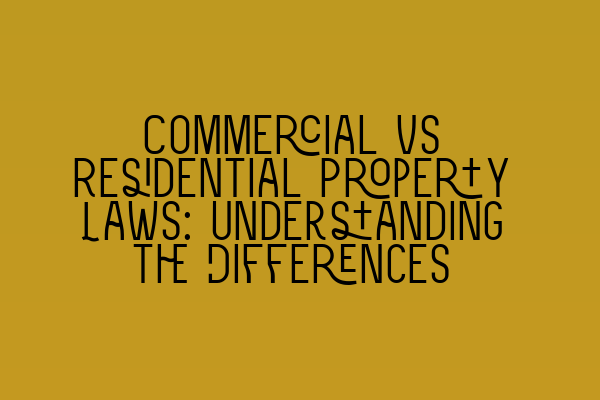Commercial vs Residential Property Laws: Understanding the Differences
When it comes to property laws, there are significant differences between commercial and residential properties. Whether you are a property owner, investor, or a legal professional, understanding these differences is crucial to ensure compliance and protect your interests. In this blog post, we will explore the key distinctions between commercial and residential property laws and highlight their implications.
Commercial Property Laws
Commercial properties refer to buildings or land that are primarily used for business purposes, such as office spaces, retail stores, warehouses, and industrial facilities. Commercial property laws focus on regulating the relationship between landlords and commercial tenants, as well as the legal aspects of leasing, buying, selling, and managing commercial properties.
Leases and Contracts:
One of the fundamental differences between commercial and residential property laws is the nature of leases and contracts. In commercial property law, leases tend to be more complex and longer-term. They often involve negotiations between the landlord and tenant regarding rental rates, lease duration, maintenance responsibilities, and other terms specific to the business’s needs. Commercial leases are also subject to fewer legal protections compared to residential leases, as commercial tenants are generally assumed to have greater bargaining power and expertise.
Zoning and Land Use:
Another crucial aspect of commercial property laws is zoning and land use regulations. Local planning authorities often enforce zoning laws that designate specific areas for commercial use. These regulations ensure that businesses operate in suitable locations and prevent incompatible land use. Compliance with zoning laws is essential for businesses to avoid legal complications and potential fines.
Property Rights and Liabilities:
Commercial property laws also differ concerning property rights and liabilities. While residential property laws tend to prioritize the rights and protections of tenants, commercial property laws primarily focus on safeguarding the rights and interests of property owners and businesses. For example, landlords have more flexibility in terms of eviction and lease termination in commercial leases, provided there is compliance with contractual agreements and legal procedures.
Residential Property Laws
Residential properties, on the other hand, are primarily used for housing purposes, including houses, apartments, condominiums, and other dwellings. Residential property laws are designed to protect the rights of tenants and provide legal frameworks for leasing, renting, purchasing, and selling residential properties.
Tenant Rights and Protections:
Residential property laws prioritize the rights and protections of tenants. They aim to ensure that individuals or families have safe and habitable living conditions and are not subjected to unfair treatment by landlords. These laws cover various aspects, including rent control, security deposits, eviction procedures, habitability standards, and other tenant rights.
Fair Housing Laws:
Fair housing laws play a significant role in residential property laws. These laws prohibit discrimination based on protected characteristics, such as race, color, religion, sex, national origin, familial status, and disability. Landlords and property owners must comply with fair housing laws when advertising, screening tenants, setting rental criteria, and enforcing lease agreements.
Property Management and Maintenance:
Residential property laws also emphasize the responsibilities of landlords and property managers regarding property maintenance and repairs. Landlords are typically required to maintain the premises in a habitable condition, address tenant concerns promptly, and ensure compliance with health and safety regulations.
Conclusion
Understanding the distinctions between commercial and residential property laws is essential for anyone involved in property ownership, investment, or legal practice. The complexity and nuances of these laws necessitate the assistance of knowledgeable solicitors who specialize in property law, such as our team at SQE Property Law & Land Law. Whether you require legal support for commercial leasing, residential tenancy, property transactions, or other property-related matters, our expert solicitors are here to help.
For further preparation on property law, explore our related articles:
1. SQE 1 Practice Exam Questions
2. SQE 1 Practice Mocks FLK1 FLK2
3. SQE 2 Preparation Courses
4. SQE 1 Preparation Courses
5. SRA SQE Exam Dates
Contact SQE Property Law & Land Law today to leverage our expertise in navigating the complexities of commercial and residential property laws. Let us assist you in making informed decisions and protecting your interests in any property-related legal matters.
